Hwyl fawrpublished at 14:40 GMT 8 February 2022
The fifth FMQs of 2022 comes to a close.
Thanks for following - join us again next week.
Mark Drakeford faces questions from MSs, in a hybrid format due to concerns about the Omicron variant.
Alun Jones
The fifth FMQs of 2022 comes to a close.
Thanks for following - join us again next week.
The first minister tells Plaid Cymru's Cefin Campbell that 1,067 Welsh Government staff are located in Mid and West Wales.
Mr Campbell says "some 19 per cent of the population of Wales live in Mid and West Wales. However, only around 13 per cent of Welsh Government posts are located in that region, and, as it happens, many of the Welsh Government's offices in the region are on the outskirts of town. So, can I ask, as we slowly move back to some kind of normality post Covid, what assessment has the Government made of moving more jobs to Mid and West Wales and using town centre buildings as offices in order to rejuvenate these towns economically and socially?"
The first minister replies "it is worth us remembering at the beginning of devolution almost all of those working for the Welsh Office were working here in Cardiff, and over the period of devolution we have created new offices in Merthyr Tydfil, in Llandudno, and, of course, in Aberystwyth as well."
He adds, "we, as a government, want to do more to work with local people to see what we can do to help people in the post-coronavirus context, where they won't have to travel every day into the major offices; they can remain local, and they can work in the local area and they can be part of the local economy at the same time."
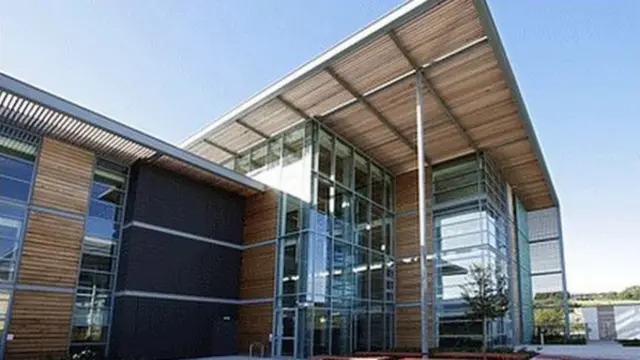 Image source, Welsh Government
Image source, Welsh GovernmentThe Welsh Government's office in Aberystwyth was opened in 2009
The first minister says the work of the National Independent Safeguarding Board for Wales is part of the legacy of the late Carl Sargeant AM.
The first minister tells Carl's son Jack, who succeeded him as the member for Alyn and Deeside, "I was very pleased to chair the inaugural meeting of the new single unified safeguarding review board, and had he been there, I think he would have been moved by the number of times references were made to Carl Sargeant, because it was when Carl was the Minister responsible that he set in motion a review of the way in which domestic homicide reviews in Wales were put to work to improve services for people who find themselves victims of domestic abuse.
"It was Carl who asked the then assistant chief constable of Dyfed Powys, Liane James, to carry out that review, and it was Liane who presented the work that lies behind the new board at that inaugural meeting."
Carl Sargeant was promoted to the cabinet in December 2009 as minister for social justice and local government. He subsequently served as housing minister and natural resources minister before being appointed cabinet secretary for communities and children in May 2016.
He was a key force in the drive to pass legislation in 2015 to tackle domestic violence, urging people to identify those responsible in an impassioned speech against "narcissistic sociopaths".
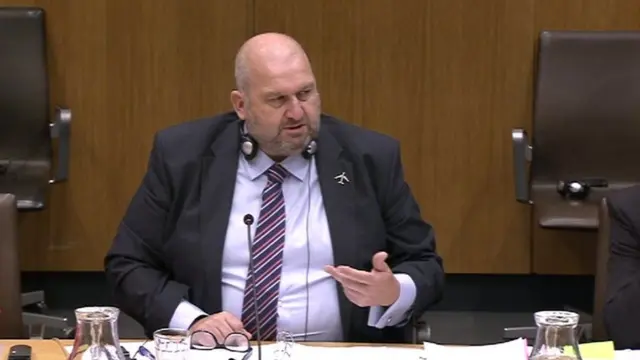
Carl Sargeant was found dead at home in Connah's Quay in November 2017 after being sacked as a Welsh Government minister
Conservative Samuel Kurtz says "a fortnight ago, Hywel Dda University Health Board signed off a programme business case for the reorganisation of healthcare services in west Wales, which, if approved and signed off by your government, will see the creation of a new hospital at a location not yet decided somewhere between Narberth and St Clears.
"This business case also sees both Glangwili and Withybush hospitals downgraded to community hospitals."
He asks, "given the strength of feeling by the community and their steadfast desire to see services retained in their local hospitals, do you now regret not meeting with the people of west Wales?"
The first minister replies, "I'm afraid the question is just completely mistaken because I did meet—I did meet—with representatives of those groups. I met them here in this building. So, he's just completely wrong, really.
"But I think his question is deeply disappointing—deeply, deeply disappointing. If the Conservative Party think that their contribution to improving services in west Wales is once again to lead a campaign against the improvements that the health board seeks to bring about, then he is doing a deep disservice to the people that he represents."
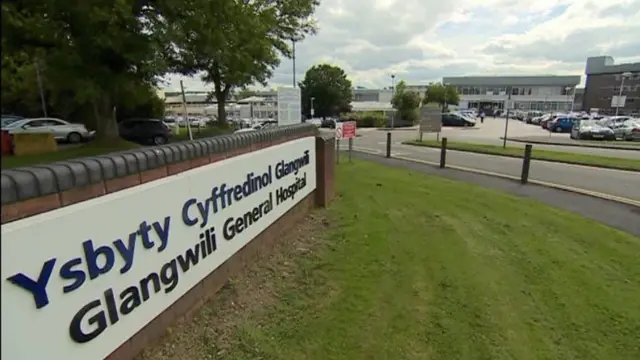
On the Welsh Government's international strategy, Conservative Tom Giffard refers to a written statement by the first minister last year in which "you mentioned that most of this work would be publicised via the @walesdotcom Twitter, Instagram and Facebook pages.
"Indeed, much of Wales's international publicity is supposed to be done via @walesdotcom.
"But, first minister, are you aware that, as of this morning, those same Twitter and Facebook pages you mentioned last year as being an integral part of your international strategy have only had one original post in the last three months, and the Instagram page has only posted once since September?"
The first minister replies, "I'm in no doubt at all that the member spends more of his time looking at those social media posts than I do.
"What I can tell him, of course, is that the Welsh Government, through the international strategy, is busy every day in making sure that Wales is promoted abroad and that we use our national day as a platform on which we can do more to make sure that the profile of Wales, opportunities for business in Wales, the work of our arts organisations, our sports organisations are known across the world, and that the profile of Wales is strengthened accordingly."
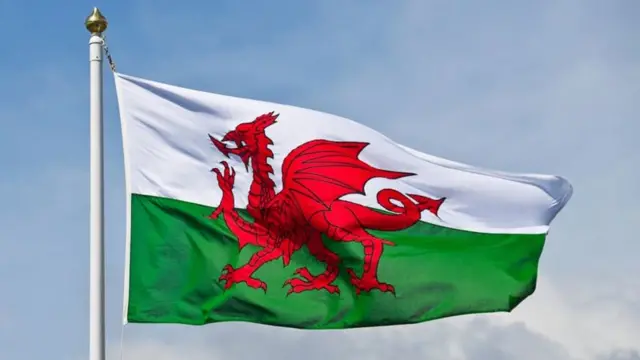 Image source, Getty Images
Image source, Getty ImagesRhun ap Iorwerth stands in for Plaid Cymru leader Adam Price, and also questions the first minister on the critical report by the Royal College of Surgeons England into vascular services at Betsi Cadwaladr University Health Board in north Wales.
He says, "I am on the record stating that we should get rid of Betsi Cadwaladr health board unless they can return to the right path, and I'm afraid that the report that we've seen now does nothing to give us confidence in the future of the health board."
He adds, "there were real questions over whether Betsi Cadwaladr was ready to come out of special measures, very conveniently before the last election. I'm looking for an assurance this afternoon that vascular services in the north will go back into special measures with targeted intervention to sort out this mess.
"And will the first minister, in reflection, now agree that the end of special measures then was premature?"
The first minister replies, "I was the Minister that placed Betsi Cadwaladr into special measures. I remember being told by Members on the floor of the Chamber that that was convenient for political purposes, just as I'm used to other parties trying to claim that the decision to bring the board out of special measures was somehow politically motivated. It was simply the result of the process that is in place.
"I cannot give the Member the guarantees that he asks for this afternoon, because those are not political decisions. Now, he may think that he, as a politician, has the answers and that we should simply rely on his political judgment, but that is not the way in which those decisions are made in Wales. There will be a tripartite meeting. The tripartite meeting will make recommendations and then, indeed, it will be Ministers who decide whether and how to act on them."
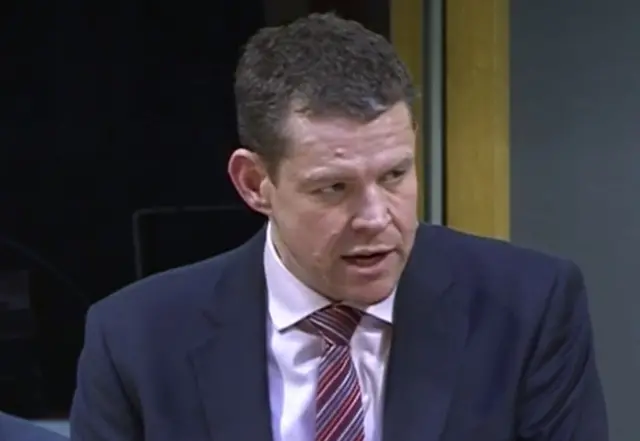
Rhun ap Iorwerth
Andrew RT Davies, leader of the Welsh Conservatives in the Senedd, calls on the first minister to apologise for the findings of a report into vascular services at Betsi Cadwaladr University Health Board in north Wales.
The critical report by the Royal College of Surgeons England makes five urgent recommendations "to address patient safety risks".
Mr Davies says "instead of trying the same thing over and over again and getting the same results, Betsi needs radical reform and restructuring so we can see change for the people in north Wales".
The first minister replies that the findings are "very disappointing" and says he expects the health board to address the issues.
He says, "I have no difficulty in apologising. I don't share the same standards as the Conservative Party, where the Prime Minister refuses to apologise time and time again for the things for which he has been so directly responsible.
"I have apologised in the past for the failings of the health board in north Wales, and the Welsh Government has taken a series of measures to assist the health board to make sure that the services people get are of the standard that they are entitled to receive."
In a controversial move, complex vascular services were centralised from Ysbyty Gwynedd in Bangor and Wrexham Maelor Hospital, to Ysbyty Glan Clwyd in April 2019.
After patients and staff raised fears about the new service at Ysbyty Glan Clwyd, Betsi Cadwaladr health board commissioned the Royal College of Surgeons to conduct a report.
Part one of that report, published last summer, made nine urgent recommendations and raised issues including too many patient transfers to the centralised hub, a lack of vascular beds and frequent delays in transfers.
The final part of the report, published on 3 February, focussed on the clinical records of 44 patients dating from 2014 - five years before centralisation - to July 2021, two years after the Ysbyty Glan Clwyd hub opened.
Assessors were "extremely concerned" about the case of a man where a decision was made to "amputate the foot rather than proceed to a below-the-knee amputation as the primary procedure".
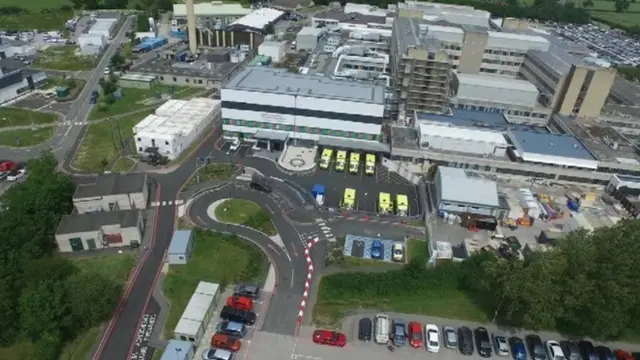
Vascular services were centralised from Ysbyty Gwynedd in April 2019 to Ysbyty Glan Clwyd
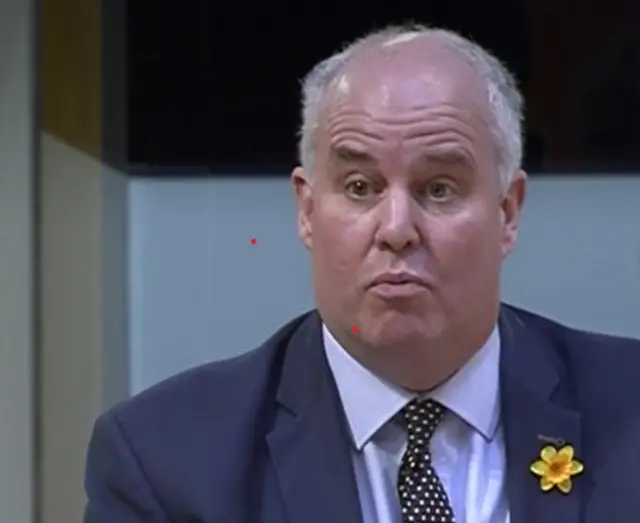
Andrew RT Davies
First Minister Mark Drakeford says his government has "repeatedly called on the UK government to act to prevent the [cost of living] crisis for which they are themselves responsible. A decade of austerity has left many more people in poverty and unable to manage the situation in which they now find themselves."
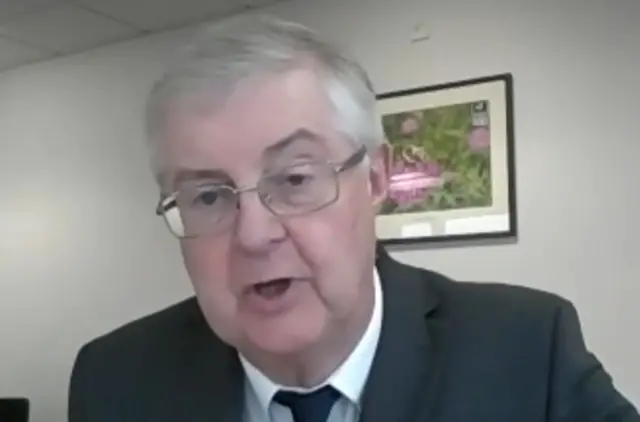
Mark Drakeford
The Llywydd (presiding officer) Elin Jones conducts a ballot to determine the names of members who may table questions to the first minister and Welsh ministers. Each member may enter their name into a ballot.
The first question today comes from Rhianon Passmore, Labour MS for Islwyn, who asks what assessment has the Welsh Government made of the funding Wales will receive from the UK Government to replace European Union funding?
First Minister Mark Drakeford replies that "Wales will receive substantially less funding from the UK government in comparison with what we have received from the European Union."
He says, "Wales would have received £375 million in funding in this calendar year from European structural funds. What will we actually get—£47 million."
What is replacing EU funds?
During the UK's membership of the EU, Wales received European money to help the economy in its poorest areas.
The cash, managed by the Welsh Government, is being slowly phased out with funding ending by next year.
After Brexit, the UK government announced it would replace this with a £2.6bn Shared Prosperity Fund.
The levelling up plans say the fund will "enable improvements to the places where people live and work".
But the Welsh Government claims that Wales will be £1bn worse off by 2024 - figures disputed by Michael Gove.
A pilot scheme -the £200m Community Renewal Fund(CRF)- saw Welsh projects given nearly a quarter of the funds.
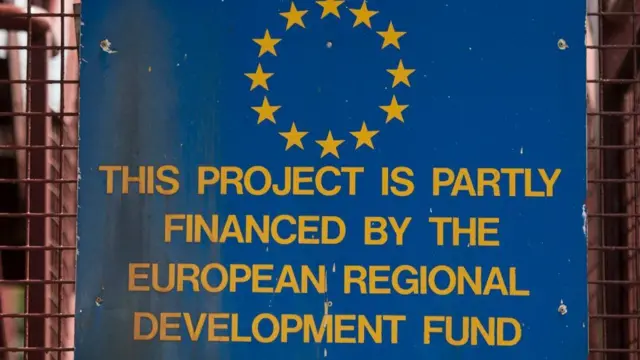 Image source, Getty Images
Image source, Getty ImagesThe Shared Prosperity Fund will replace EU economic cash
Hello and welcome to our live coverage of the fifth session of First Minister's Questions in 2022.
The meeting is being held n a hybrid format, with some members in the Siambr (Senedd chamber) and others joining by video-conference.